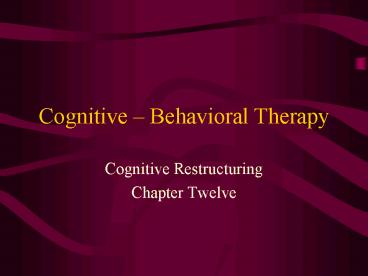Cognitive Behavioral Therapy - PowerPoint PPT Presentation
1 / 21
Title:
Cognitive Behavioral Therapy
Description:
Aaron Beck utilizes a cognitive approach to treat depression ... Conceived by Aaron Beck at the same time Ellis was developing REBT ... – PowerPoint PPT presentation
Number of Views:1182
Avg rating:3.0/5.0
Title: Cognitive Behavioral Therapy
1
Cognitive Behavioral Therapy
- Cognitive Restructuring
- Chapter Twelve
2
Introduction
- Although behaviorists have traditionally tended
to reject other psychological approaches, some
blending has taken place between behaviorism and
certain types of treatment approaches
collectively, referred to as cognitive therapies.
3
- A major theoretical assumption of cognitive
therapy, is that individuals interpret and react
to events in terms of their perceived
significance. That is to say, that human
behavior is mediated by cognition. - A second assumption, is that cognitive
deficiencies can cause emotional disorders. - The primary focus of therapy, therefore, is to
make fundamental changes in a persons
cognition's, or belief system.
4
Two basic models
- Cognitive Restructuring Therapy Teaches clients
to change distorted and erroneous cognitions or
beliefs that maintain their problem behaviors.
- Cognitive-Behavioral Coping Skills Therapy
Teaches adaptive responses to deal effectively
with difficult situations they encounter.
5
The major players in the field
- Albert Ellis developed the principles of
Rational Emotive Behavior Therapy - Aaron Beck utilizes a cognitive approach to
treat depression - Donald Meichenbaum most prolific of the
theorists today (chapter 13) - Maxie Maultsby expanded on Elliss work to
develop Rational Behavior Therapy
6
Albert Ellis and REBT
- Trained originally in Freudian psychoanalytic
methods - Felt that insight had little value in solving
problems - REBT is based on the premise that there is a very
close connection between what we say to ourselves
and how we feel
7
Aaron Becks Cognitive Therapy
- Developed a procedure similar to REBT
- Believed that neurotic individuals engage in
dysfunctional thinking - Major technique used was hypothesis testing
- Also utilized homework assignments
- Examples of dysfunctional thinking would be
8
- Dichotomous thinking thinking in absolute terms
- Arbitrary inference drawing a conclusion on
inadequate evidence - Overgeneralization reaching a general
conclusion based on too few instances - Magnification exaggerating the meaning or
significance of a particular event
9
Rational Emotive Behavior Therapy
- Comprehensive short term therapy
- Makes maximal use of self-help techniques
- Based on the fact that the world is non-magical
and that the events will occur if the conditions
are present.
10
Four Basic Theoretical Assumptions
- Brain is the main organ for learning/self control
- Coordinates the voluntary nervous system and the
peripheral nervous system - Words nouns, verbs, adjectives are self taught
cries that trigger emotional and physical
reactions. Your thoughts are largely words. - Motivation comes from wanting something or
avoiding something, combination of two!
11
Features of REBT
- Easy to learn - does not take years of extensive
training like psychoanalysis - Increases efficiency gain quick insight into the
nature of the behavior with immediate involvement
of the client. Frees up professional time. - Main therapeutic goal is to use the brain in the
healthiest, most efficient manner.
12
Process of REBT
- As indicated, the goal of REBT, is to modify a
clients belief system. This is done by - identifying thoughts that are based on irrational
beliefs - challenging the irrational beliefs
- replacing thoughts based on irrational beliefs
with ones that are based on rational beliefs
13
The ABCs of your emotions
Self Talk
Event
Actions
Feeling
A
B
C
D
14
- A is the event as you perceive it
- Bis what you are telling yourself about the
event - C is how you feel about the event
- D are the actions you will tale based on your
feelings
15
Facts vs. Personal Truths
- Personal truth is based on your opinion.
Personal truths can hurt you in many ways
emotionally, financially, physically.
- Facts are based on objective reality. We dont
have to like the facts, just accept them so that
we can move on.
16
As mentioned earlier, words provide the
emotional triggers for our faulty thinking...
17
For example...
- It - it doesnt upset me I control how I
feel - What if? - If it happens, Ill do the best I
can - Awfulizing - Its not life or death, only
inconvenient - Absolutes- Always and never rarely tell it like
it is - Should - Wheres the law? Magical vs..
Scientific - Have to - I dont have to, I choose to.
- Yes, but - Justifying keeping faulty beliefs
18
Characteristics of rational thinking
- They are based on objective reality
- They lead you to protect your health and life
- They help you attain your short an long range
goals - They help you feel the way you want to feel
- They keep you out of significant conflict with
others
19
Cognitive Therapy
- Conceived by Aaron Beck at the same time Ellis
was developing REBT - Goals of cognitive therapy are
- correct clients faulty information processing
- modify clients dysfunctional beliefs that
maintain maladaptive behaviors and emotions - provide clients with the skills and experiences
that create adaptive thinking
20
Socratic Dialogue
- The therapist asks the client a series of easily
answerable questions that lead the client to
recognize their faulty beliefs. Not as directive
as REBT.
21
All things considered...
- Ellis and other cognitive behaviorists report
that this approach has been successful in
treating a wide variety of problems such as
depression, extreme fears, impotence, etc.. - However, there is not a great deal of empirical
research since it is more of a practitioners
approach.

